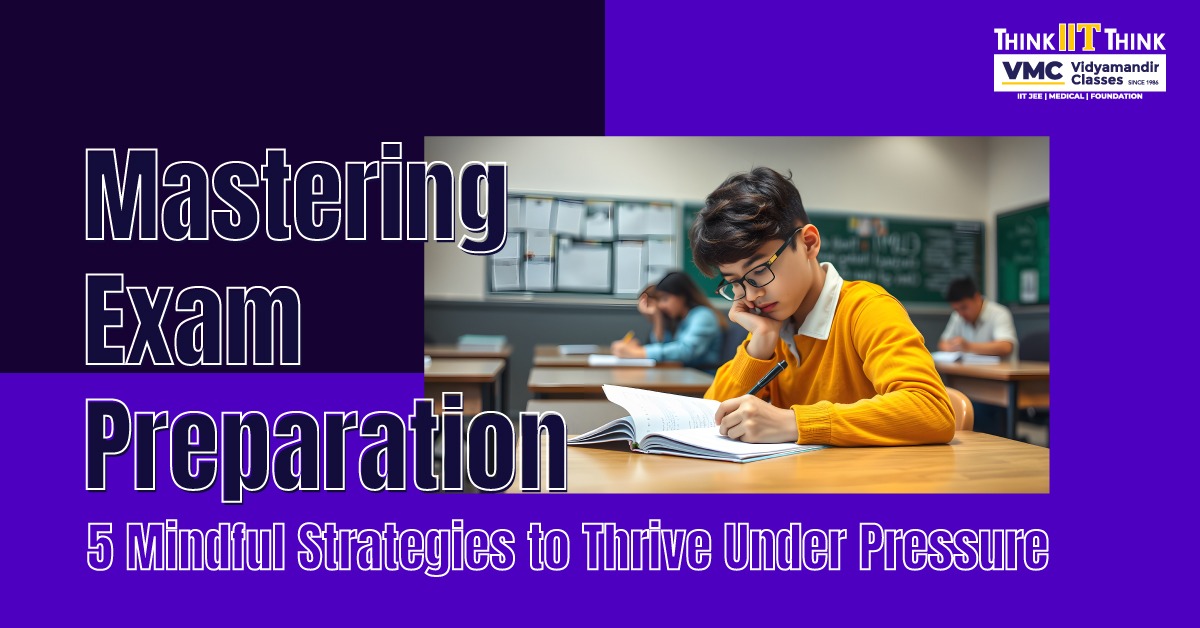Mastering Exam Preparation: 5 Mindful Strategies to Thrive Under Pressure
 Posted On
Posted On
108 total views, 2 views today
Exams are an inevitable part of student life, and while they hold significant importance, the pressure they bring often leaves students feeling stressed and overwhelmed. Balancing academic performance with mental well-being can seem daunting, but with the right approach, it’s possible to navigate the exam season mindfully. Here are five strategies that can help you excel under pressure while keeping your peace of mind intact.
1. Keep Perspective: Exams Aren’t Everything
One of the most crucial elements of mindful exam preparation is maintaining a balanced perspective. Exams, while important, are only a part of your broader academic and life journey. It’s easy to feel that your grades will define your future or worth, but this simply isn’t the case. Focusing too much on achieving perfection can lead to unnecessary stress and burnout.
Instead, strive to do your best, not necessarily to be perfect. It’s okay to aim high, but remember that your self-worth isn’t tied to the numbers on your grade sheet. Recognizing that your academic success is only one aspect of your life will ease some of the pressure and allow you to approach studying with a clearer and calmer mind. Honor the little victories along the road and concentrate on making progress rather than perfection.
2. Ask for Help: You Don’t Have to Face This Alone
It’s common to think of studying as a solo activity, but preparing for exams doesn’t have to be a lonely endeavor. In fact, one of the most effective ways to stay motivated and manage stress is to form study groups with like-minded friends. When you study with others, you not only gain new perspectives but also share the workload, making the process feel more manageable. These group sessions can become an interactive learning experience where you support and challenge each other.
Furthermore, in the event that you feel overburdened, don’t be afraid to ask for assistance. Many schools offer counseling services, and talking to a counselor or mentor can provide valuable emotional support and practical advice. Holding each other accountable in study groups or with friends can create a positive reinforcement system, helping you stay on track while also reducing anxiety.
3. Use Innovative Learning Resources to Make Studying Fun
Who said studying can’t be fun? Adding enjoyable and creative study techniques to your routine will greatly improve retention and enjoyment. For instance, you can turn key concepts into catchy songs or rhymes. This technique is particularly helpful for memorizing large chunks of information. Singing or even rapping your study material can make it more engaging and memorable.
You could also use visual learning tools like mind maps or flashcards. Mind maps help organize complex information in a simple and visual format, enabling better recall during exams. Flashcards can be particularly useful for quick revision and testing yourself on essential points. The idea here is to break away from monotonous study techniques and incorporate elements of play and creativity into your preparation. When you find ways to make learning enjoyable, it transforms the exam prep process into something less stressful and more engaging.
4. Don’t Overdo It: Balance Study with Self-Care
In the rush to prepare for exams, many students adopt a “no pain, no gain” mentality, which often leads to neglecting important self-care habits. While it’s tempting to push your limits and spend every waking moment studying, this approach often leads to burnout, which negatively impacts your ability to retain information and stay focused.
It’s crucial to strike a balance. Allow yourself to ease up on non-essential routines but don’t completely abandon them. For example, if you usually exercise intensely, switch to lighter, moderate physical activities during exam season. Exercise can help keep your mind sharp and improve memory, so even a short walk or stretching session can do wonders for your mental state.
Getting enough sleep is another essential part of exam preparation. All-nighters might seem like a good idea when the clock is ticking, but depriving yourself of sleep can impair your cognitive function and make it harder to recall information during the actual exam. A well-rested mind is far more effective than one running on caffeine and stress.
5. Take Breaks: Clear Your Mind to Decrease Stress
When you’re in the thick of exam prep, it’s easy to fall into the trap of studying for hours on end without taking breaks. However, research shows that our brains can only focus effectively for short periods of time, typically around 45-60 minutes. Working beyond this leads to diminishing returns, where you might be putting in the hours but not absorbing information effectively.
This is where mental breaks come into play. When you start feeling overwhelmed or find your concentration waning, it’s time to step away from the books. These breaks don’t need to be long—just 5-10 minutes can be enough to reset your mind and reduce stress. Use this time to do something that makes you happy, whether it’s listening to music, enjoying a quick snack, or simply stretching your legs.
Another powerful technique during these breaks is practicing mindfulness. Take a moment to focus on your breathing, think about positive memories, or visualize things that bring you joy. This helps shift your mindset and reduces the feelings of stress and anxiety that often accompany exams. You’ll feel more rejuvenated and prepared to approach the content with fresh attention when you get back to studying.
Conclusion: Embrace the Process with Mindfulness
Exam season is undoubtedly challenging, but it doesn’t have to be overwhelming. By adopting mindful strategies like maintaining perspective, seeking support, making studying fun, balancing work and self-care, and taking mental breaks, you can transform your exam preparation into a more positive and productive experience.
Remember, exams are just one chapter in your academic journey. With the right mindset and preparation techniques, you can approach them with calm and confidence, ensuring both your well-being and success.




